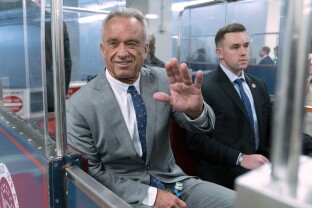Nine former directors of the Centers for Disease Control and Prevention sounded an alarm on Monday in a rare op-ed decrying Health and Human Services Secretary Robert F. Kennedy Jr.’s shake-up of the public health agency.
The group, which served under both Democratic and Republican administrations stretching back to 1977, wrote that he is “endangering” the lives of everyday Americans who rely on the CDC for unbiased scientific information.
“What [RFK Jr.] has done to the C.D.C. and to our nation’s public health system over the past several months — culminating in his decision to fire Dr. Susan Monarez as C.D.C. director days ago — is unlike anything we have ever seen at the agency, and unlike anything our country has ever experienced,” the group wrote in The New York Times.
The group cited a number of cuts to programs that protect Americans from “cancer, heart attacks, strokes, lead poisoning, injury, violence and more,” as well as canceled research into a number of deadly diseases. Also on the list of dangerous changes are cuts to global vaccine programs and Republican-led legislation that includes deep cuts to Medicaid, which will disproportionately affect rural hospitals.
“This is unacceptable, and it should alarm every American, regardless of political leanings,” the guest essay reads.
The group consists of William Foege, William Roper, David Satcher, Jeffrey Koplan, Richard Besser, Tom Frieden, Anne Schuchat, Rochelle P. Walensky and Mandy K. Cohen.
Their op-ed is just the latest warning issued by current and former officials who have worked at the federal agency after a series of high-profile changes instituted by Kennedy. After Monarez’s ouster last week, at least three leaders at the CDC quit in protest, saying that their ability to protect public health by relying on unbiased science was in jeopardy.
“From my vantage point as a doctor who has taken the Hippocratic oath, I only see harm coming,” Dr. Demetre Daskalakis, the former director of the CDC’s National Center for Immunization and Respiratory Diseases, said Sunday on ABC’s “This Week,” part of a weekend media tour undertaken by the three resigning officials.
“From my vantage point, as a doctor who’s taken the Hippocratic oath, I only see harm coming.”
— This Week (@ThisWeekABC) August 31, 2025
Dr. Demetre Daskalakis, who stepped down from the CDC’s National Center for Immunization and Respiratory Diseases, on HHS Sec. Kennedy’s impact at the agency. https://t.co/S4HNboo73S pic.twitter.com/Jj7qYPCMoW
Dr. Debra Houry, the departing chief medical officer and deputy director for program and science at the CDC, told CNN’s Manu Raju Sunday that not a single official with the agency had briefed Kennedy on vaccine policy since he became secretary. In the months since, he has made blockbuster moves to restrict emergency use approval for COVID-19 shots and clear out membership of the Advisory Committee on Immunization Practices, which is responsible for making safety recommendations and sets the U.S. immunization schedules for both adults and children.
“I think it’s going to be very difficult to [trust information coming from the CDC],” Houry said. “With projected budget cuts, we will not be ready for the next pandemic.”
Daskalakis also predicted that Kennedy’s reconstituted ACIP will move to restrict Hepatitis B vaccines for newborns, which he said are safe and can prevent liver scarring and cirrhosis later in life for children who contract the virus.
Debra Houry, top CDC official who resigned in protest, says of RFK Jr: “None of our scientists have ever briefed the secretary over vaccines.”
— Manu Raju (@mkraju) September 1, 2025
Says it’s going to be “very difficult” to trust CDC when new info is released. And says CDC not prepared anymore for another outbreak. pic.twitter.com/BX10nGeJoZ
In their op-ed, the nine former CDC directors called on Americans to come together in support of the agency, which is “hurting badly.”
“During our respective C.D.C. tenures, we did not always agree with our leaders, but they never gave us reason to doubt that they would rely on data-driven insights for our protection, or that they would support public health workers,” they wrote.
“The current H.H.S. leadership, however, operates under a very different set of rules.”
Sign in
Log into your free account with your email. Don’t have one?
Check your email for a one-time code.
We sent a 4-digit code to . Enter the pin to confirm your account.
New code will be available in 1:00
Let’s try this again.
We encountered an error with the passcode sent to . Please reenter your email.


